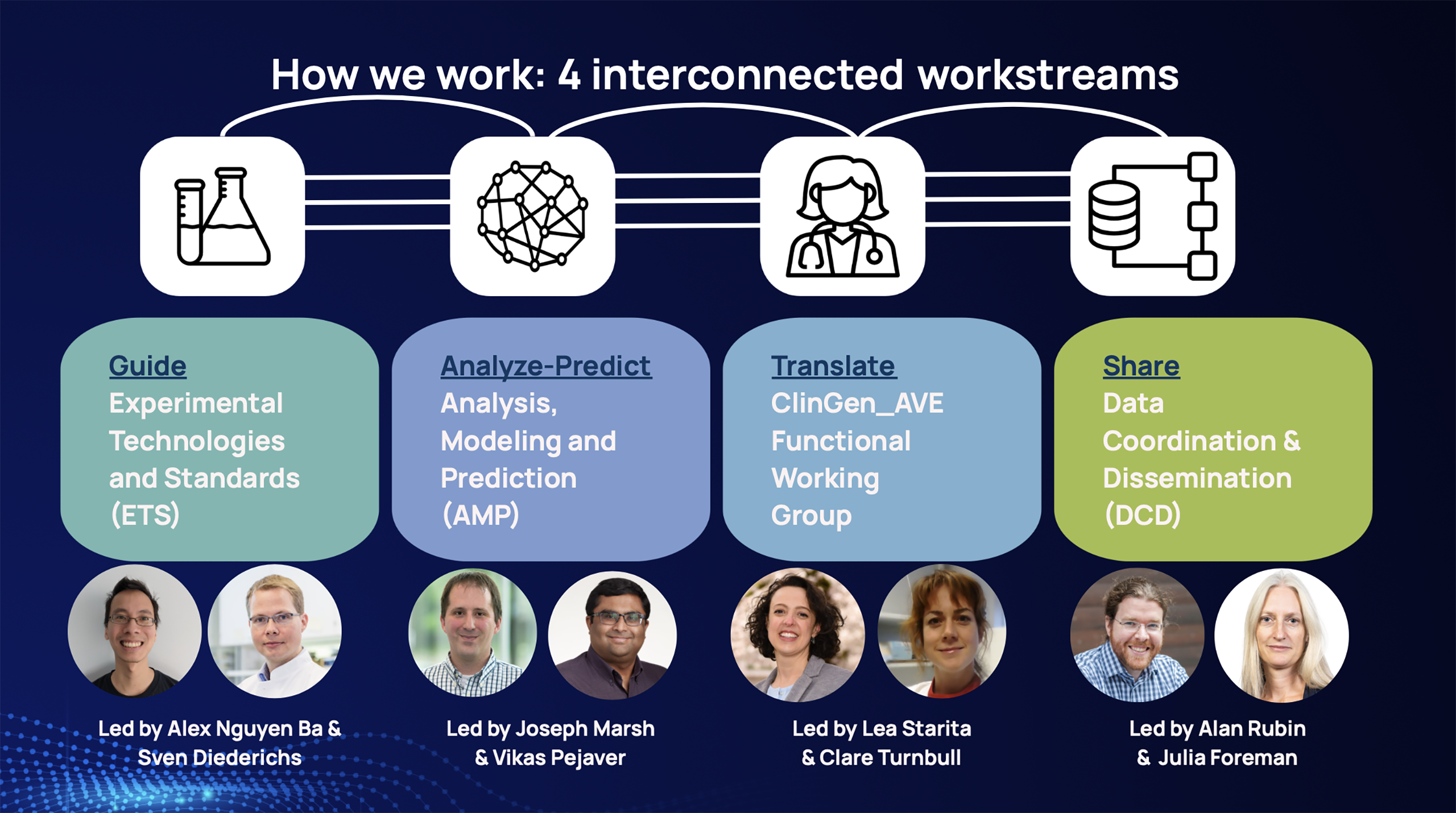Workstreams
Alliance Workstreams are responsible for realizing the goals of the Alliance in key areas by setting standards, providing tools and disseminating information.

Analysis, Modelling and Prediction (AMP)
AMP Strategic ROADMAP
The Analysis, Modelling and Prediction (AMP) workstream (formerly known as Variant Scoring Tools and Methods) will develop strategies to assess variant scoring, error estimation and visualization methods. AMP will evaluate the impact of experimental design choices like library complexity, number of independent cells and sequencing depth on the accuracy of scoring and error estimation. AMP will also be responsible for developing reporting standards to enable evaluation of the quality of MAVE datasets in terms of internal controls, replicability and minimal information to be included.
Workstream lead(s):
Joseph Marsh (University of Edinburgh) and Vikas Pejaver (Institute for Genomic Health and the Department of Genetics and Genomic Sciences, Icahn School of Medicine at Mount Sinai)
Contributors/ Members:
Mafalda Dias (CRG)
Jonathan Frazer (CRG)
Justin Kinney (Cold Spring Harbor Laboratory)
Sushant Kumar (University of Toronto)
Kresten Lindorff-Larsen (Copenhagen University)
David McCandlish (Cold Spring Harbor Laboratory)
Kyriaki Michailidou (Cyprus Institute of Neurology and Genetics)
Victoria Offord (Wellcome Sanger Institute)
Rose Orenbuch (Harvard Medical School)
Fabrizio Pucci (Université Libre de Bruxelles)
Courtney Shearer (Harvard University)
Jimmie Ye (UC San Francisco)
Juannan Zhou (University of Florida)
ClinGen/AVE Functional Data Working Group
This Working Group will focus on approaches for calibration of functional assays for use in variant classification, guiding Variant Curation Expert Panel (VCEP) use of multiplexed assays of variant effects (MAVE) data, facilitating the development and testing of VCEP curated variants in MAVE and other functional assays, informing priorities of large-scale efforts to generate functional data as well as functional data model development and providing input on how to effectively integrate functional data into ClinGen tools.
Workstream lead(s):
Lea Starita (BBI/UW) and Clare Turnbull (ICR)
Contributors/ Members:
Sophie Allen (ICR)
Dustin Baldridge (WashU)
Kevin TA Booth (Indiana University)
Alicia Byrne (Broad Institute/ Harvard)
Jeffrey Calhoun (Northwestern)
Rui Chen (University of California, Irvine)
Randy Cockerell (UNC)
Shawn Fayer (BBI, UW)
Andrew Glazer (Vanderbilt University)
Anna L Gloyn (Stanford)
Jenny Goldstein (UNC)
Christopher Heinen (University of Connecticut)
Sujatha Jagannathan (University of Colorado Anschutz)
Melissa Landrum (NIH/NCBI)
Ashley Marsh (Ambry Genetics)
Lara Muffley (University of Washington)
Tina Pesaran (Ambry Genetics)
Lizzie (Elizabeth) Radford (Cambridge)
Deborah Ritter (Baylor College of Medicine)
Frederick Roth (Univ. of Pittsburgh)
Alan Rubin (WEHI)
Amanda Spurdle (QIMR Berghofer)
Lea Starita (BBI/UW)
Patricia Sullivan (Children’s Cancer Institute)
Clare Turnbull (ICR)
Rehan Villani (QIMR Berghofer)
Barbara Vona (University Medical Center Göttingen)
Alex Wagner (Nationwide Children’s Hospital)
Daniel Zimmerman (University of Pittsburgh)
Data Coordination and Dissemination (DCD)
DCD Strategic ROADMAP
The Data Coordination and Dissemination (DCD) workstream facilitates the sharing and discoverability of MAVE projects and MAVE data.
Members of this workstream may:
- Engage with clinical and non-clinical data resources and providers to enable MAVE data sharing, including federation with other resources identified by data consumers (e.g. ClinGen, UniProt, PharmGKB)
- Define and promote standards and infrastructure for MAVE data deposition, coordination and dissemination
- Define and promote infrastructure for data deposition, coordination and dissemination
- Write review, recommendation or guideline papers, often in conjunction with other AVE work streams
- Oversee the growth and management of MaveDB
Workstream lead(s):
Alan Rubin (WEHI) and Julia Foreman (DECIPHER, EMBL-EBI)
Contributors/ Members:
Jeremy Arbesfeld (Nationwide Children’s Hospital, Wagner Lab)
Carol Bult (The Jackson Laboratory)
Melissa Cline (UC Santa Cruz)
Helen Firth (Newnham College, Cambridge)
Matthew Forbes (Wellcome Sanger Institute)
Mattia Frontini (University of Exeter)
Sarah Hunt (Ensembl)
Sumaiya Iqbal (Broad Institute)
Rachid Karam (Ambry Genetics)
Shannon McNulty (UNC)
Jingyou Rao (UCLA)
Kevin Riehle (ClinGen)
James Stephenson (EMBL-EBI)
Kirill Tsukanov ((EMBL-EBI) )
Alex Wagner (Nationwide Children’s Hospital; GA4GH)
Jian-Rong “Phillip” Yang (Sun Yat-sen University)
Andy Yates (EMBL-EBI)
Experimental Technology and Standards (ETS)
ETS Strategic ROADMAP
This workstream facilitates the development, scaling, evaluation, comparison and dissemination of new MAVE methods. Members of this team:
- Develop measures by which to evaluate experimental methods, e.g., what information should go on a ‘report card’ for a mutagenized library, a transfection step, a flow-sorting experiment.
- Develop an information resource for alternative technologies with protocols, tips, caveats.
- Design physical standards (mutagenized libraries, barcode libraries, gRNA pools) that can enable controlled comparison of other tech steps, and strategies for sharing physical standards across groups.
Workstream lead(s):
Alex Nguyễn Ba (University of Toronto) and Sven Diederichs (DKFZ | University Hospital Freiburg)
Contributors/ Members:
Benedetta Bolognesi (IBEC)
Michael Böttcher (Martin Luther University)
Melina Claussnitzer (Harvard, Broad Institute)
Sven Diederichs (DKFZ | University Hospital Freiburg)
Guillaume Diss (Friedrich Miescher Institute)
Andrew Glazer (VUMC)
Jacob Kitzman (University of Michigan)
Andrea Martella (AstraZeneca)
Kenneth Matreyek (Case Western)
Daniel O’Neill (AstraZeneca)
Victoria Nicole Parikh (Stanford University)
Fritz Roth (University of Toronto)
Daniel Tabet (University of Toronto)
Valeria Vasta (University of Washington)
